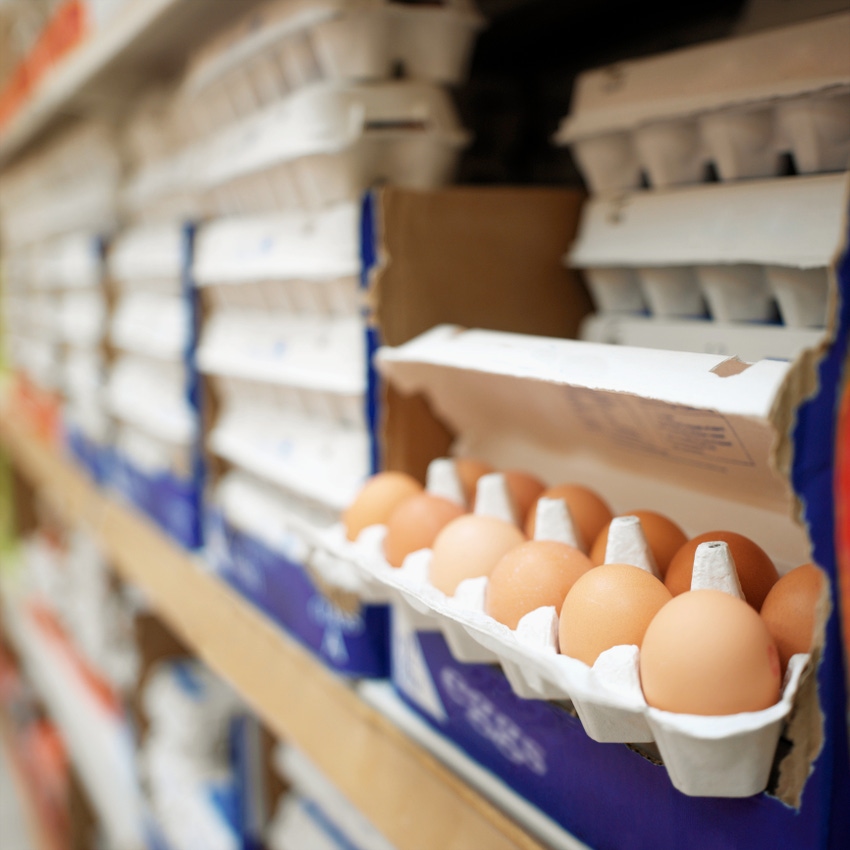State takes steps to ensure that low-income consumers have option to buy affordable eggs.

The Iowa House and Senate each approved a bill that would require Iowa grocers to offer conventional eggs if they also sell eggs from chickens housed in a cage-free, free-range or enriched colony cage environment for any low-income government programs.
House File 2408 was approved 32-17 in the Senate after being approved on an 81-17 vote in the House last week. It now heads to Republican Gov. Kim Reynolds for her signature. (Her office did not indicate whether she would sign the bill, saying only that it hadn’t received the bill from Congress yet.)
State Sen. Dan Zumbach, who farms in northeastern Iowa, said the bill was brought to the legislature on behalf of the people of Iowa. “Producers, grocers and consumers all weighed in on the value of what it would bring. This bill did not carry any partisanship from beginning to end. It was always about what is in the best interest of Iowans,” Zumbach said.
He noted that the bill provides assurance to parents with young children participating in the Women, Infants & Children (WIC) program that conventional eggs will be available for purchase with their government-issued WIC benefit. Zumbach said state rules already mandate grocers to supply conventional eggs for WIC participants. “This bill simply put into code what is already happening,” he explained.
It is additionally about ensuring that tax dollars are used effectively and efficiently. “Taxpayers also wanted to be assured their tax dollars would be used on conventional eggs and not expensive specialty eggs,” Zumbach added.
Kevin Stiles, executive director of the Iowa Poultry Assn. (IPA), told Feedstuffs that the organization was not involved in drafting the legislation but does support it. “The bill is consistent with our IPA policy supporting consumer choice of eggs -- of all types -- at retail,” he said.
Zumbach said producers saw value in the bill because they have the ability to produce the types of eggs consumers demand.
Stiles noted that although it is difficult to determine sales of cage-free eggs in Iowa, it is estimated that they make up less than 10% of total egg sales. Even nationally, the numbers are just approximately 10% of the total egg sales volume.
“Producers now have the choice to raise specialty eggs of all types or conventional eggs, whichever is in their own interest,” Zumbach said.
He said grocers appreciate what the bill has to offer because it allows them to offer an array of egg products to meet consumer demands. “Consumers are now ensured all types of eggs are available and their choices can be met,” Zumbach added.
Grocers in Iowa have not jumped on the bandwagon of committing to selling only cage-free eggs by a certain time frame, as many companies have. Hy-Vee -- one of the major grocers in Iowa -- noted in a statement in May 2016 that consumer choice is important and that it would not make “irrational decisions” on a transition to cage-free eggs.
“Unfortunately, several organizations and activists have used mainstream media and social media to put pressure on many national and regional retailers to offer only cage-free eggs to their customers, therefore forcing the egg industry to change the way it does business. We are a company that has always put our customers’ best interests first. We are also located in states that are home to some of the largest egg producers in the United States. Before we act, we always think through how our decisions will impact our customers,” Hy-Vee said in its statement.
Another major grocer in Iowa, Fareway, also declined to be pressured into changing the type of eggs it offers its consumers.
“When a pro-vegan animal rights group recently sought to use mainstream and social media to threaten Fareway with a ‘negative publicity campaign’ to force Fareway to offer only cage-free eggs, Fareway thoroughly examined the issue – beginning with the potential adverse impact to area farmers,” the company said in a statement. “Rash decisions in this environment would risk turning our back on our local farmers, and they deserve better.”
The Des Moines Register reported that state Sen. Herman Quirmbach opposed the bill, complaining that it's clearly contrary to free-enterprise, anti-regulation policies espoused by Republicans. "This is really direct interference in the marketplace," the publication quoted him as saying.
About the Author(s)
You May Also Like




.png?width=300&auto=webp&quality=80&disable=upscale)
